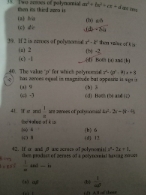CBSE Class 10 Answered
if the answer of the sum for some quadratic polynomial is 2/3 can it be written as -(-2)/3 as it is mentioned to be -b/a (can we write like this in the exams if its correct)
Asked by ravikaartik | 11 Jun, 2015, 05:35: PM
For a quadratic equation ax2+bx+c=0, the sum of the roots is -b/a
So the final result of sum depends on the sign of 'a' and 'b'.
For example, if the quadratic equation is 2x2+3x+5=0, the sum of the roots is -3/2. (negative)
if the quadratic equation is 2x2-3x+5=0, the sum of the roots is -(-3)/2= 3/2. (positive)
So, the sum of the roots depend on the signs of 'a' and 'b'.
But if the result is 2/3, you dont have to write it as -(-2)/3. Simply divide 'b' by 'a' and put a negative sign. That gives you the sum of the roots of any quadratic.
Hope this helps.
Answered by satyajit samal | 12 Jun, 2015, 09:30: AM
Application Videos
Concept Videos
CBSE 10 - Maths
Asked by anubhutiupadhaya | 14 Mar, 2024, 11:57: AM
CBSE 10 - Maths
Asked by reetudetha | 08 Jan, 2024, 04:12: PM
CBSE 10 - Maths
Asked by mysticsurya201 | 04 Jan, 2024, 08:25: PM
CBSE 10 - Maths
Asked by fatehbahadurtiwari3 | 30 Dec, 2023, 06:25: PM
CBSE 10 - Maths
Asked by dhaneswarnimal80 | 11 Nov, 2023, 06:50: AM
CBSE 10 - Maths
Asked by skandachiranjeevin | 01 Nov, 2023, 08:58: PM
CBSE 10 - Maths
the value 'p'for which polynomials x²-(p²-9)x+8has zeroes equal in magnitude but opposite in sign is


Asked by sazimkhan178 | 16 Sep, 2023, 11:27: AM
CBSE 10 - Maths
Asked by pranavtamboli65 | 09 Jul, 2023, 09:13: PM
CBSE 10 - Maths
Asked by rekhapreetham | 15 Jun, 2023, 08:23: PM
CBSE 10 - Maths
Asked by dimpaldihingia2 | 24 May, 2023, 06:10: PM









